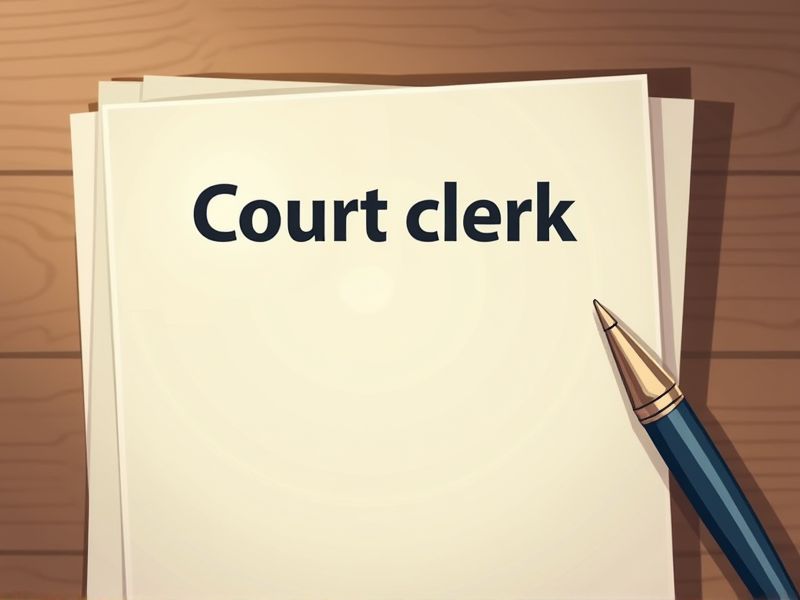
Court clerks play a vital role in the judicial system by managing court records and ensuring procedural accuracy. Certifications enhance their ability to handle legal documents efficiently and reinforce their understanding of legal terminology and court procedures. Acquiring certifications also increases a clerk's credibility and may lead to better job opportunities and career advancement. Consider obtaining several important certifications for a successful career as a court clerk.
Certified Court Clerk (CCC) Certification
Certified Court Clerk (CCC) Certification ensures that a court clerk has attained the necessary skills and knowledge to effectively handle legal documentation and court procedures. This certification establishes a standardized level of competence, which enhances the efficiency and accuracy of court operations. Courts with certified clerks experience fewer administrative errors, reducing delays and increasing public trust in the judicial process. The CCC Certification can improve career prospects and professional growth opportunities for court clerks, leading to job stability and advancement.
Certified Legal Manager (CLM)
Court clerks benefit from earning a Certified Legal Manager (CLM) designation as it enhances their understanding of legal procedures and management. This certification equips them with skills in finance, communications, and technology, essential for efficient court operations. With a CLM, court clerks can improve case management and administrative functions, directly impacting court efficiency. Courts with certified clerks often experience improved workflow and reduced operational errors.
Certified Paralegal Professional (CPP)
A Certified Paralegal Professional (CPP) can enhance the efficiency of a court clerk's duties by providing comprehensive knowledge of legal procedures. CPPs often possess advanced organizational skills, which help streamline case management and reduce errors. Their specialized training equips them to handle complex document preparations, ensuring accuracy and compliance with legal standards. Employing a CPP also minimizes the need for extensive on-the-job training, which saves time and resources for the court system.
Legal Office Administration Certification (LOAC)
A Legal Office Administration Certification equips court clerks with the necessary skills to handle complex legal documents efficiently. Certification enhances understanding of legal terminology, which is crucial for accurate communication and record-keeping in the court system. The structured training improves clerks' ability to manage case files and deadlines, ensuring smooth court operations. Employers prioritize candidates with certification as it signifies a standardized level of expertise and competence.
Records Management Certification (RMC)
A Court clerk handles sensitive legal documents and RMC ensures they adhere to best practices in records management, mitigating errors and loss. Legal processes rely heavily on accurate documentation, and RMC equips Court clerks with the skills to manage, retrieve, and archive records effectively. Compliance with legal standards and regulations becomes streamlined through RMC, reducing the risk of legal disputes or penalties. Efficient recordkeeping enhances courtroom proceedings and decision-making, and RMC provides the necessary credibility and expertise.
Certified Electronic Records Specialist (CERS)
Certified Electronic Records Specialist (CERS) ensures court clerks manage and maintain digital records with accuracy and security, aligning with legal requirements. Digital records demand skilled oversight to prevent data breaches, making CERS essential for safeguarding sensitive information. Courts increasingly rely on electronic documentation, requiring clerks to possess specialized skills to handle digital files efficiently. CERS certification provides court clerks with the expertise needed to enhance efficiency and compliance in managing court records.
Certified Administrative Professional (CAP)
Court clerks with Certified Administrative Professional (CAP) credentials demonstrate validated expertise in administrative skills, enhancing court efficiency. CAP certification ensures court clerks are equipped with up-to-date industry knowledge, reducing procedural errors. Enhanced organizational skills from CAP training lead to more accurate record-keeping, crucial for maintaining judicial integrity. The credential also boosts trust in court systems, as it signals a commitment to professional development and excellence.
Notary Public Certification
Court clerks often handle legal documents that require validation to prevent fraud, making notary public certification a valuable asset. Notary certification equips clerks with the authority to authenticate signatures, ensuring the integrity of legal records. Courts benefit from clerks who can independently validate documents on-site, streamlining the legal process and reducing delays. Notary public certification enhances the credibility and trust in the documentation managed by the court clerks.
Microsoft Office Specialist (MOS) Certification
The Microsoft Office Specialist (MOS) Certification ensures a court clerk is proficient in essential Office applications, increasing efficiency in document management tasks. Mastery in programs like Word and Excel is critical for handling legal documents and data management within judicial environments. Certification demonstrates verified skills, potentially reducing errors and enhancing accuracy in court documentation. Employers often prefer certified clerks for these reasons, which aligns with the demand for skilled administrative support in legal settings.
Certified Records Manager (CRM)
A Certified Records Manager (CRM) is crucial for a court clerk as it ensures accurate management and preservation of vital court documents, supporting legal integrity. With legal procedures requiring precise documentation, a CRM can standardize records management, reducing instances of misfiling or loss. Courts dealing with complex litigation often encounter voluminous records, making a CRM's skills in information retrieval and organization essential for maintaining workflow efficiency. Proper records management also safeguards against unauthorized access, thus reinforcing confidentiality and compliance with legal standards.
Summary
When you acquire certifications as a court clerk, your career opportunities expand significantly. Certifications increase your marketability, making you a more competitive candidate for promotions or specialized roles. As a result, you gain deeper legal knowledge, enhancing your efficiency and productivity. Employers also benefit from your improved skill set, potentially leading to positive organizational outcomes.
